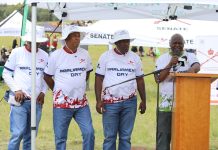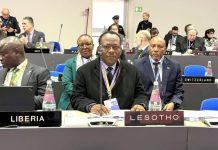
Africa-Press – Lesotho. Vultures are crucial to the ecosystem but face a myriad of challenges including poisoning and disturbance at breeding sites. Director of wildlife and national parks, Dr Kabelo Senyatso said recently at Gootau at the official handing over of the Batho le Ditsatlholego Conservation Trust.
He urged community members to own the project intended to conserve Cape vultures as well as conservation and sustainable rural livelihoods improvement.
The project will run for the next two years and was funded to the tune of P570 000 by Global Environment Facility (GEF) small grants and facilitated by the United Nations Development Programme (UNDP).
Dr Senyatso said government interventions were not sufficient to address all the threats facing vultures and that civil societies such as Batho le Ditsatlholego Conservation Trust were crucial. He encouraged the conservation trust to own the project and implement it diligently.
In addition to saving vultures, he said the projects were also meant to boost local economies and create sustainable jobs for vulnerable groups such as women, youth and people living with disabilities.
He said sustainability was key in projects supported through the environment facility as sustainable development was the cornerstone of the Transitional National Development Plan and Vision 2036.
Dr Seyatso said the global environment facility was one of the initiatives that government, through the Ministry of Environment and Tourism, was implementing with support from the UNDP. He said the launch of the grant marked a significant milestone for his ministry and UNDP as the first vulture conservation project in Botswana.
Further, he said Batho le Ditsatlholego responded to the call for proposals aimed at addressing climate change mitigation and adaptation, biodiversity conservation and sustainable land management for improved livelihoods that was advertised the in local media and UNDP.
He said the global facility was aligned and contributed to the attainment of aspirations and visions at both the global, regional and national levels.
Since inception in 1992 the global environment facility programme has supported government in environmental conservation as well as driving the sustainable development agenda through supporting community led projects with the potential for up-scaling and replication by government and other partners.
Dr Senyatso said it was apparent that the rate of natural resource exploitation and the use of the physical environment would soon reach the threshold for our existence on planet earth.
He said scientific evidence showed that the natural resource stocks were being depleted at increasing rates and that the natural capital has diminished in quality and quantity.
He added that the increasing loss of biological diversity, land degradation, desertification, water stress, food insecurity, health pandemics and natural disasters had become regular concerns.
He said climate change threatened the sustainability of livelihoods and that poverty continued to overwhelm developments efforts. He said it was critical than ever for humanity to pay more attention to getting the balance right between what was economically feasible, socially desirable and environmentally sustainable.
He said it was for that reason that they wanted to see initiatives funded contributing to protection and conservation of biodiversity and natural resources.
The founder of Batho Le Ditsatlholego Conservation Trust, Mr Sentle Mosweu appealed to Gootau, Manaledi and Goosekgweng residents to support the trust.
For More News And Analysis About Lesotho Follow Africa-Press





